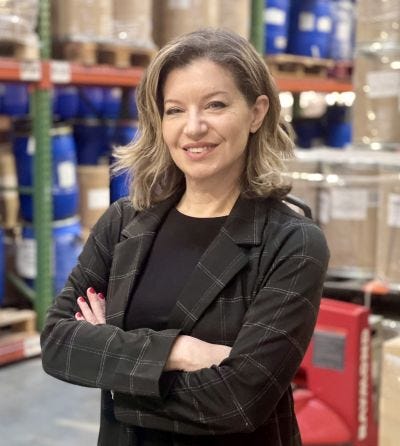The female product category is experiencing an unprecedented shift, marking a pivotal moment for women's branded ingredients, writes Rena Cohen-First of nutraceutical ingredients supplier Cepham.

At a Glance
- An embarrassingly large gap still exists in women’s clinical research.
- We are witnessing a convergence of ancient herbal wisdom with the future of modern technology.
- Women, regardless of their roles, are now more attentive than ever to neglected aspects of their health.
Being deeply involved in both the nutritional ingredient sales and women's health spheres, I have a unique perspective on the evolving landscape of branded ingredients.
From eagerly sharing the latest nutritional insights with friends and family during industry lectures to witnessing the groundbreaking work of pioneers like Inger Reidun Aukrust, Ph.D., — the first person to synthesize vitamin K2 (MK-7) — my journey has been shaped by over 26 years of experience.
From my early days as an industry newcomer in 1997, when the internet was just beginning to make its mark, to my current collaborations with artificial intelligence (AI) pioneers, I can attest to the transformative changes that have taken place. Today, the female product category is experiencing an unprecedented shift, marking a pivotal moment for women's branded ingredients.
The advances and the gaps
New technologies are reshaping our approaches to just about everything. At the same time, an embarrassingly large gap exists in women’s clinical research, stemming from decades of women being blocked from participating in trials due to concerns around childbearing years.
As much of our industry is aware, women's participation in clinical trials was banned by the Food and Drug Administration from 1977 through 1993, and an enormous gap still remains. In fact, the percentage of Fortune 500 female CEOs (10.4%) is higher than the percentage of sports research studies focused on women (6%), according to a 2021 article published in Women in Sport and Physical Activity Journal. Consider that wearables can now predict menstruation by temperature, and yet the impact of menstruation on sports performance has only recently been clinically studied. Science needs to catch up.
At the same time, AI is opening up information that had previously been lost for centuries. Ancient herbal medicines look very different now than they did on parchment, and it is fascinating to watch. What we are witnessing firsthand is the true convergence of ancient herbal wisdom with the future of modern technology.
Lessons in futurism
As my youngest child graduates from high school, I find my attention turning toward the topic of aging, particularly in caring for my aging parents. At 50, I am increasingly interested in female hormonal health across all stages of life. This subject resonates with women who prioritize comprehensive female wellness.
Years ago, I had the privilege of taking a class with the pioneering Helen Harkness, Ph.D., one of the earliest female leadership and executive coaches at the University of Texas at Dallas. In her late 80s at the time, she passionately taught about futurism, referencing writer and futurist Alvin Toffler and his concept of future shock.
Today, I see this concept playing out in my generation, Gen X, as well as in Baby Boomers and the "Silent Generation" (I can't help but chuckle at the irony of watching my dad overshare on Facebook). My love for futurism persists. Interestingly, while I fumble with my smartphone, my daughter, a Gen Z satellite engineer, navigates technology with ease.
Despite struggling to keep up with my iPhone, I am deeply immersed in the world of branded ingredient ingenuity. One name that consistently emerges in my research on AI and ayurveda is my own boss.
Converging AI and ayurveda
Anand Swaroop, Ph.D., is the brilliant mind behind most of the AI and ayurveda’s global scientific advances thus far, in more ways than most people in the U.S. natural products industry are aware of. I had the luxury of working with Indian botanical manufacturers for years and jumped at the chance to work for Cepham when an opportunity opened up last year.
India is not only the world’s most diverse medicinal magic garden, but it also has a uniquely open policy of AI research, which is absolutely where we are heading.
For example, we wanted to find a solution to address the nuanced spectrum of women's health concerns, including hormone balance, mood support and focus. Healthy aging, stress and menopause have become top concerns amid an aging population, and a longstanding gap in understanding women’s health. Women, regardless of their roles, are now more attentive than ever to neglected aspects of their health.
Swaroop began his research by asking his mother, who directed him straight away to the “queen” of ayurveda. Shatavari (Asparagus racemosus root) holds a rich ayurvedic history and truly is known as the “queen of adaptogens.”
Shatavari has been cherished by women in traditional medicine for centuries and enjoyed throughout life, ritualistically between mother and daughter, in ghee or baked goods, marking rites of passage such as childbirth and menopause.
Through Cepham’s rapid in-house research and comprehensive data analysis, we identified the specific bioactive molecules responsible for the adaptogenic effects of shatavari and introduced a trademarked, heroine adaptogen tailored for women's self-care throughout life called SheVari4.
We standardized the 2,000-year-old matriarch to her bioactive compound, shatavarin IV, a steroidal saponin proven to provide significant benefits for various women's health issues. With phytoestrogenic and antioxidant properties, it aids the body in returning to homeostasis amidst life's internal and external stresses.
Then, we optimized SheVari4 in ways and forms that allow for the ritually important cookies to be baked or ceremonial teas to be steeped in our kitchens; functional applications in supplements, gummies, beverages and baked goods are key. Now, Cepham is at the forefront of integrating AI into ayurvedic practices for contemporary applications.
The women's health movement is at a tipping point. As we embrace healthy aging and the era of AI, what’s next? What’s old is new and what’s ancient is the future.
Read more about:
Supplement scienceAbout the Author(s)
You May Also Like






.png?width=800&auto=webp&quality=80&disable=upscale)